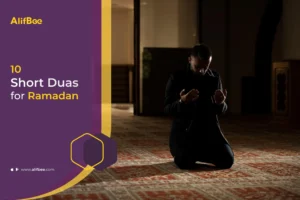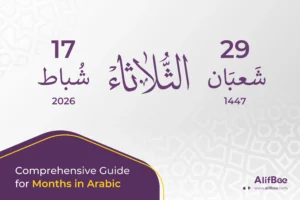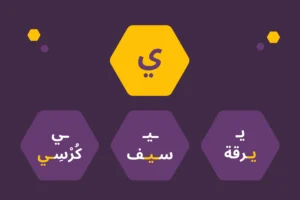10 Fascinating Arab Traditions That’ll Make You Fall in Love with the Culture
Some traditions feel like habits. Others feel like home. In Arab communities, traditions do both. They guide the way people greet one another, share meals, celebrate love, and show respect. At their core, they reflect what matters most—family, faith, generosity, and a strong sense of belonging.
For anyone learning Arabic, visiting an Arab country, or simply curious, these traditions help you see the language and the people behind it more clearly.
For each tradition, you’ll get a quick look at where it came from and why it still matters today. You’ll also learn a few Arabic words and phrases that are part of the tradition with the Arabic script, pronunciation, and English meaning to help you feel more confident using them.
We’ll include visuals to help you picture how these traditions are lived every day.
By the end of this journey, you won’t just know what these traditions are, you’ll feel why people love them.
Let’s begin.
Why Arab Traditions Matter in Daily Life
In the Arab world, tradition is a part of daily life and shapes how people treat each other. You notice it in the way people come together, share food, talk to elders, and even where they sit. These little habits carry big meaning, built on kindness, family, respect, and hospitality.
These customs maintain strong communities and make people recall their origins. Despite the fact that life is always quick-changing, such customs assist individuals in remaining close and being proud of their culture.
Arab traditions aren’t old customs locked in the past. They’re living ways of keeping identity strong and relationships close. The more you understand them, the more naturally you’ll feel part of the culture.
Key Arab Traditions and Customs
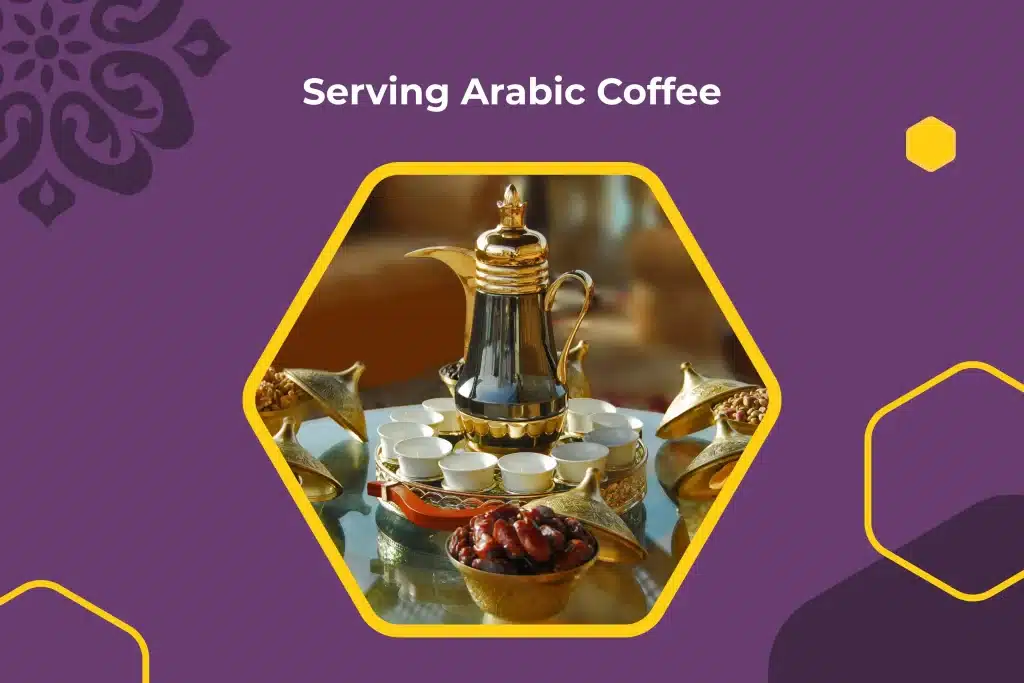
Serving Arabic Coffee (Qahwa)
In many Arab countries, especially in the Gulf, serving Arabic coffee is a daily tradition that shows respect and kindness. It’s common when welcoming guests, visiting family, gathering with friends, celebrating weddings, or even meeting for business.
The coffee, usually flavored with cardamom, is poured from a traditional pot called a dallah into small cups known as finjān and offered to guests as a warm welcome.
English
Arabic Word/Phrase
Transliteration
Arabic
Arabic coffee
Qahwa
qah-wah
قَهْوَة
Small coffee cup
Finjān
fin-jaan
فِنْجَان
Coffee pot
Dallah
dal-lah
دَلَّة
Please (offering)
Tafaḍḍal
ta-faḍ-ḍal
تَفَضَّل
Guest
Dhaif
dhayf
ضَيْف
Tip from AlifBee: Arabic coffee is always served with the right hand, beginning with the eldest guest. When you’re done drinking, gently shake the cup to signal you’ve finished. Saying “Shukran” (thank you) as you hand it back is a polite way to show respect.
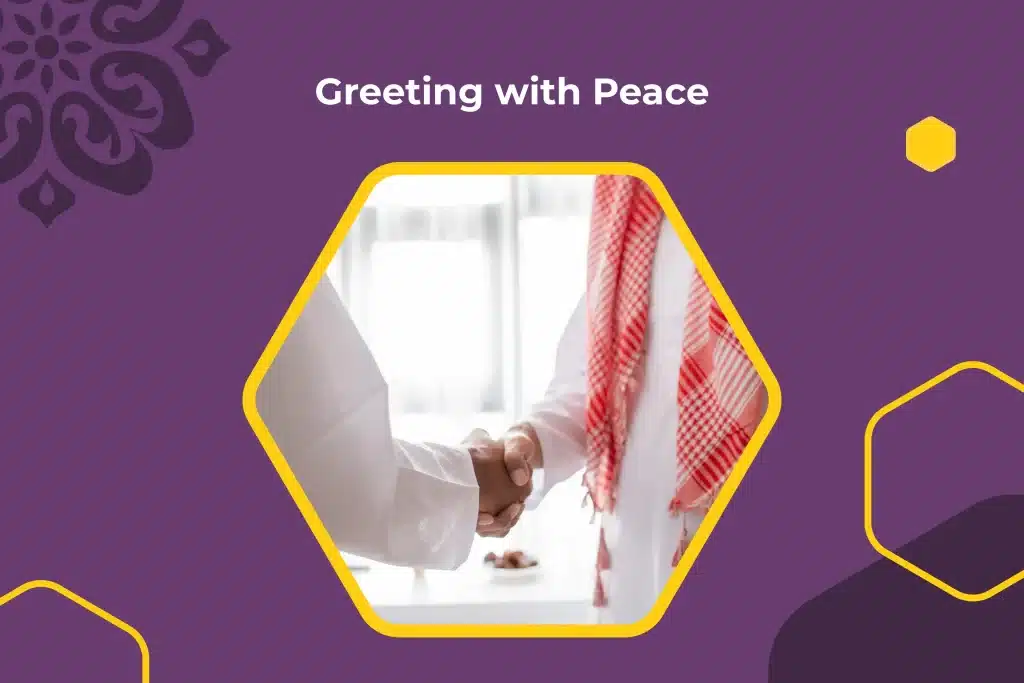
Greeting with Peace
Greeting others in the Arab world is more than politeness; it’s a simple way to acknowledge others with warmth and goodwill.
The phrase “As-salamu ʿalaykum” (“Peace be upon you”) is used daily when entering a home, starting a conversation, or arriving at a gathering.
This greeting is deeply rooted in Islamic tradition, but it’s used widely across Arabic-speaking societies, regardless of setting—social, religious, or professional. The expected reply is “Wa ʿalaykum as-salam” (“And peace be upon you too”).
English
Arabic Word/Phrase
Transliteration
Arabic
Peace be upon you
As-salamu ʿalaykum
as-sa-laam ʿa-lay-kum
السَّلَامُ عَلَيْكُمْ
And peace be upon you too
wa ʿa-lay-kum as-sa-laam
fin-jaan
وَعَلَيْكُمُ السَّلَامُ
Hello / Welcome
Marḥaba
mar-ha-ban
مَرْحَبًا
Welcome
Ahlan wa sahlan
ah-lan wa sah-lan
أَهْلًا وَسَهْلًا
Nice to meet you
Tasharrafna
ta-shar-raf-na
تَشَرَّفْنَا
Tip from AlifBee: Always reply to a greeting—ignoring it can seem rude. In formal settings, men often follow with a light handshake. When greeting between men and women, it’s polite to wait and see if the other person offers a handshake first.
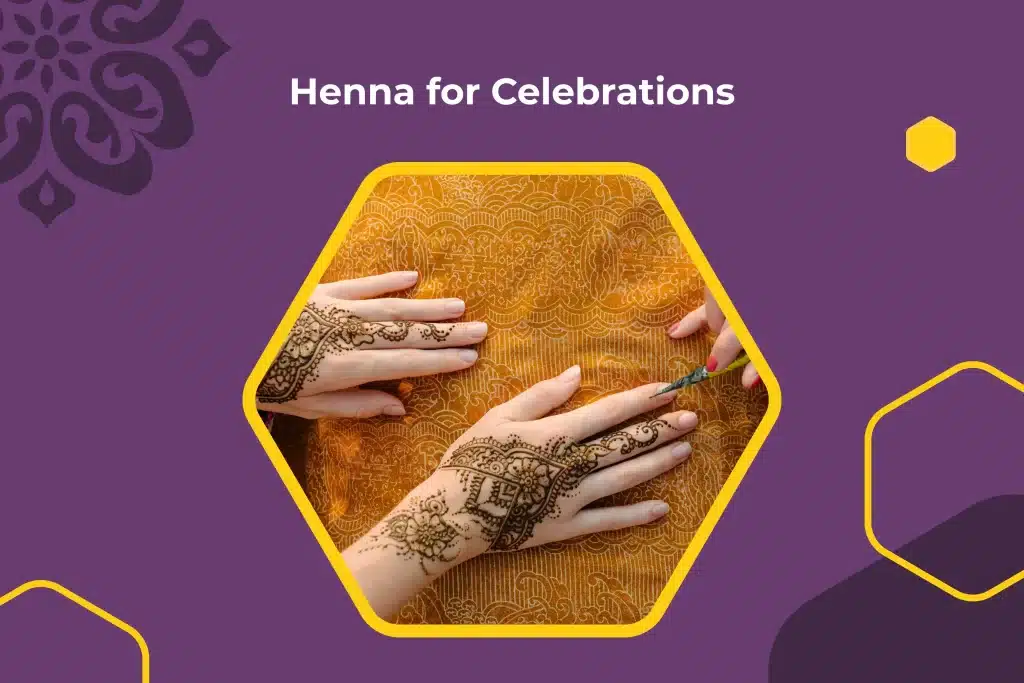
Henna for Celebrations
Henna night is a pre-wedding celebration common in North African, Egyptian, Palestinian, and Gulf cultures. A night or two before the wedding, Laylat al-Henna brings family and friends together with music, dancing, and the tradition of painting the bride’s hands and feet with henna.
Even though it’s done a bit differently in each place, it’s always a happy time filled with blessings and bonding between women. Henna is believed to bring good luck, keep away jealousy, and stand for joy and fertility.
English
Arabic Word/Phrase
Transliteration
Arabic
Henna
Ḥennāʼ
hin-naaʼ
حِنَّاء
Henna night
Laylat al-Ḥinnāʼ
lay-latu al-hin-naaʼ
لَيْلَةُ الحِنَّاء
Bride
ʿArūs
ʿa-roos
عَرُوس
Ululations (cheers)
Zaghārīd
za-gha-reed
زَغَارِيد
Joy / celebration
Farḥa
far-ha
فَرْحَة
Tip from AlifBee: On henna night, you’ll often hear music and see people dancing while the bride gets her hands and feet decorated. In many places, friends and family bring her small gifts—like a scarf, a bottle of perfume, or jewelry—to wish her love and happiness.
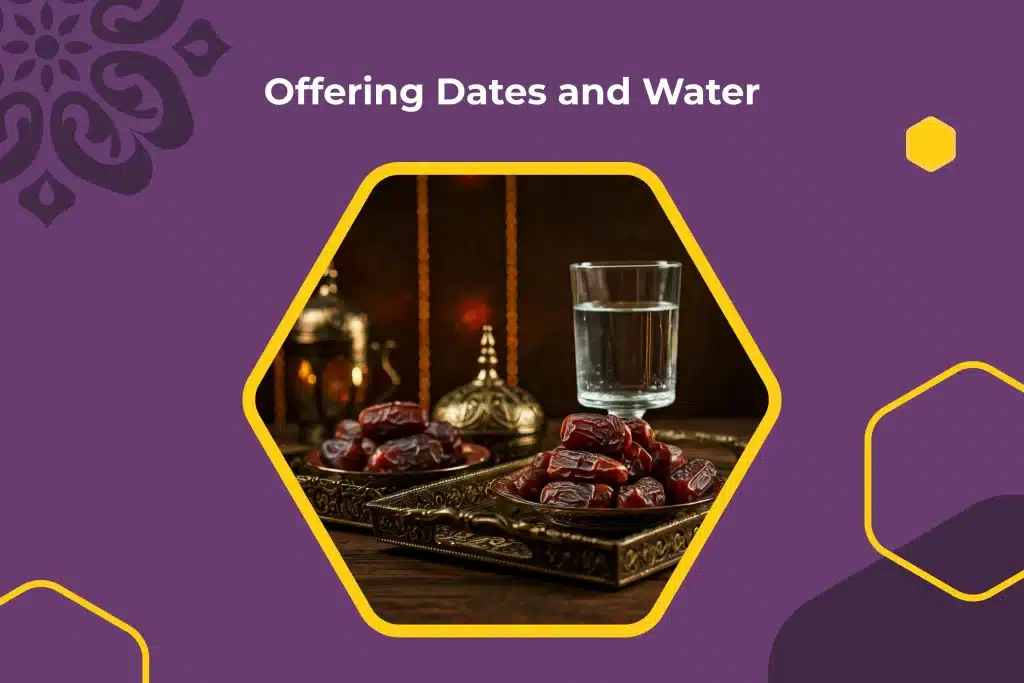
Offering Dates and Water
In many Arab homes during Ramadan, it’s common to welcome people with dates and water. This follows the Prophet Muhammad’s tradition and shows kindness and care. Even outside Ramadan, offering dates is a warm way to greet guests or show hospitality.
English
Arabic Word/Phrase
Transliteration
Arabic
Dates (fruit)
Tamr
tamr
تَمْر
Water
Māʼ
maaʼ
مَاء
Breaking the fast
Iftār
if-ṭaar
إِفْطَار
Fasting
Ṣawm
ṣawm
صَوْم
Blessing
Baraka
ba-ra-ka
بَرَكَة
Tip from Alifbee: When breaking fast with others, it’s polite to say “Ṣawman maqbulan, ifṭāran shahiyan” (صَوْمًا مَقْبُولًا، إِفْطَارًا شَهِيًّا) “May your fast be accepted and your meal be delicious.” This small phrase warmly shares blessings at ifṭār.
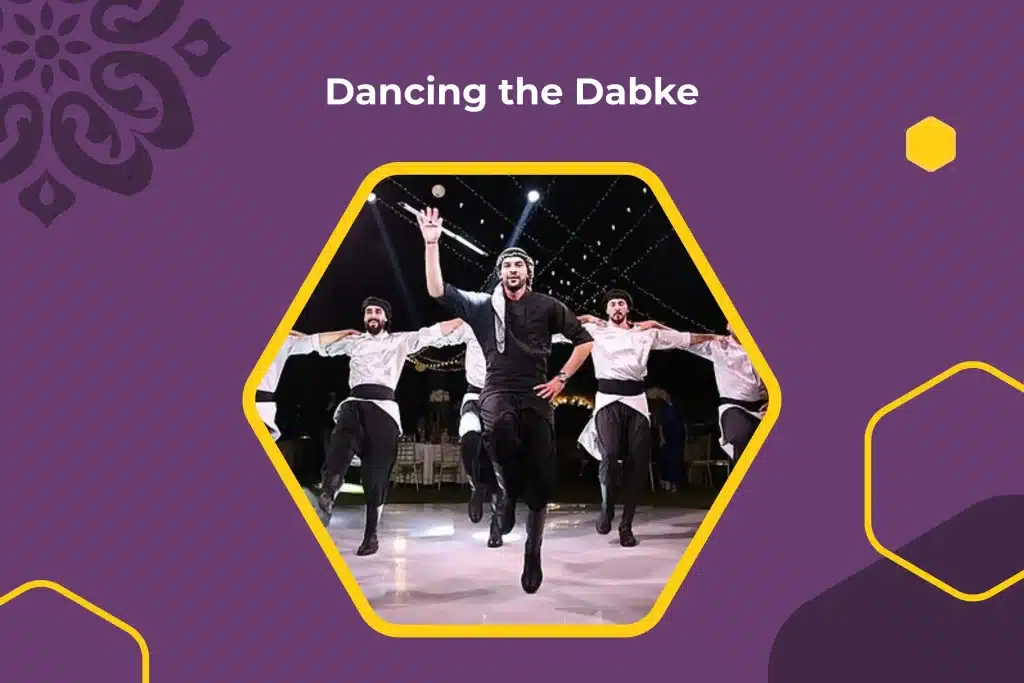
Dancing the Dabke
Dabke is a traditional dance you’ll see at weddings and parties in places like Palestine and Lebanon. People link hands or shoulders and move together to music, usually led by someone in front called Raqqāṣ who sets the rhythm. It’s loud, fun, and brings everyone together.
English
Arabic Word/Phrase
Transliteration
Arabic
Traditional folk dance
Dabke
dab-keh
دَبْكَة
Dancer / lead dancer
Raqqāṣ
raq-qāṣ
رَقَّاص
Drum
Ṭabl
ṭabl
طَبْل
Traditional double-pipe flute
Mijwiz
mij-wiz
مِجْوِز
Joy / celebration
Farḥa
far-ḥa
فَرْحَة
Tip from AlifBee: At celebrations, joining the Dabke line—even if you don’t know the steps—is a great way to connect with the community and share in the joy.
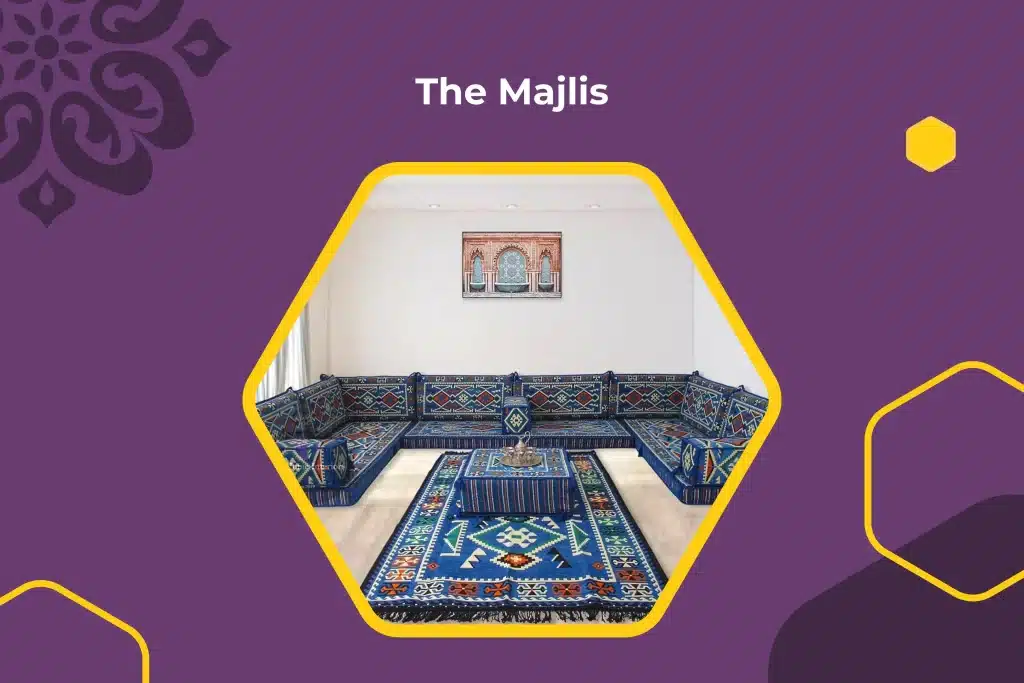
The Majlis — Gathering for Conversation
The Majlis is where people gather to talk, drink tea or coffee, and spend time together. In many Arab homes, it’s the heart of the house—a place for stories, laughs, and catching up with visitors. The Majlis can be formal or casual and is often decorated with cushions and carpets for comfort.
English
Arabic Word/Phrase
Transliteration
Arabic
Sitting room / gathering
Majlis
maj-lis
مَجْلِس
Tea
Shāy
shāy
شَاي
Coffee
Qahwa
qah-wah
قَهْوَة
Another word for Majlis
Ahlan wa sahlan
dee-wān
دِيوَان
Warmth / coziness
Daf’
dif’
دِفْء
Tip from AlifBee: Inviting someone to your Majlis is a sign of great respect and friendship. Guests usually sit according to age and status, with elders given priority.
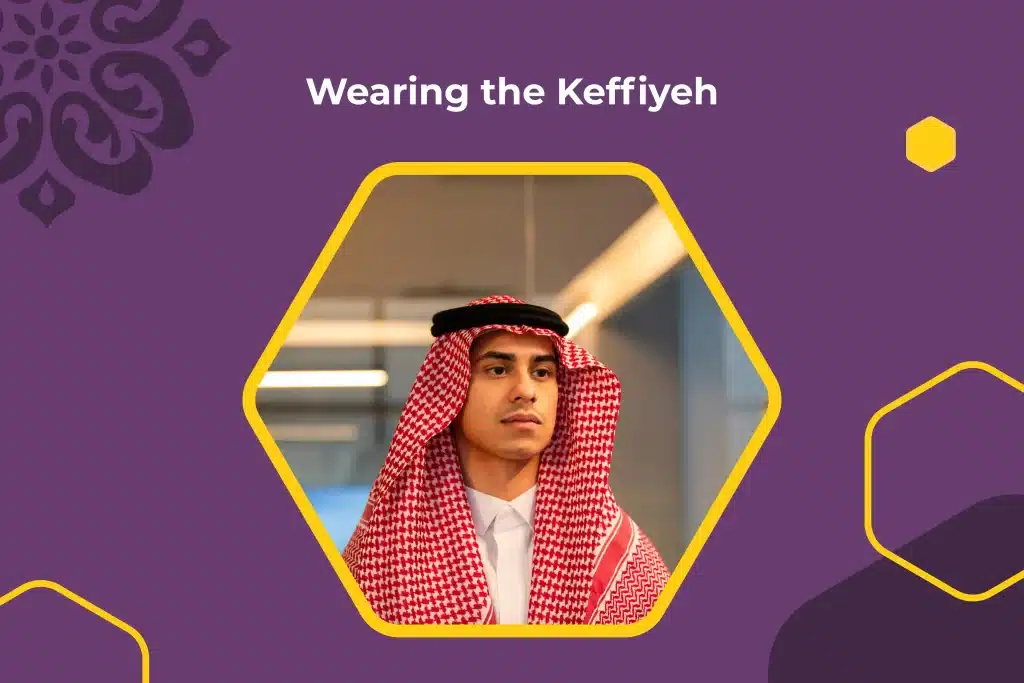
Wearing the Keffiyeh
The Keffiyeh, or Hatta, is a checkered scarf often worn by men in Palestine and nearby countries. It symbolizes national pride, heritage, and resistance. While it started as practical protection from sun and dust, today it’s also a political and cultural symbol worn proudly in daily life and special occasions.
English
Arabic Word/Phrase
Transliteration
Arabic
Traditional headscarf
Keffiyeh / Hatta
kef-ee-yeh / hat-ta
كُوفِيَّة / حَطَّة
Woman’s headscarf
Shīlah
shay-la
شِيلَة
Protection
Ḥimāyah
ḥi-mā-yah
حِمَايَة
Traditions / customs
Taqālīd
ta-qā-līd
تَقَالِيد
Headband to hold scarf
ʿIṣmah
ʿiṣ-mah
عِصْمَة
Tip from AlifBee: Wearing the Keffiyeh with the right colors and style can express regional identity. It’s often draped over the shoulders or wrapped around the head.
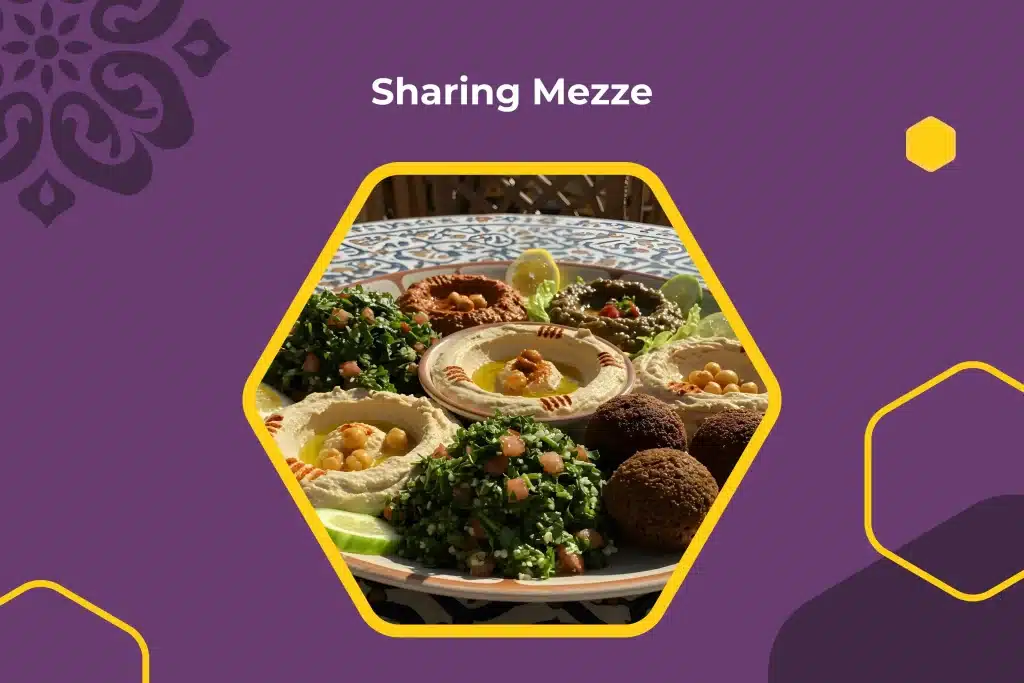
Sharing Mezze
Mezze is a mix of small plates that people share before the main dish. It’s not just about food—it’s a way for family and friends to sit together, chat, and enjoy different tastes like hummus, falafel, and tabbouleh.
English
Arabic Word/Phrase
Transliteration
Arabic
Small dishes / appetizers
Mezze
mez-zeh
مِزَّة
Chickpea dip
Hummus
hum-mus
حُمُّص
Parsley salad
Tabbouleh
tab-boo-leh
تَبُّولَة
Fried chickpea balls
Falafel
fa-la-fel
فَلافِل
Flatbread with toppings
Manāqīsh
ma-na-qeesh
مَنَاقِيش
Tip from AlifBee: When eating mezze, it’s polite to share and try a bit of everything. Eating together strengthens bonds and celebrates generosity.
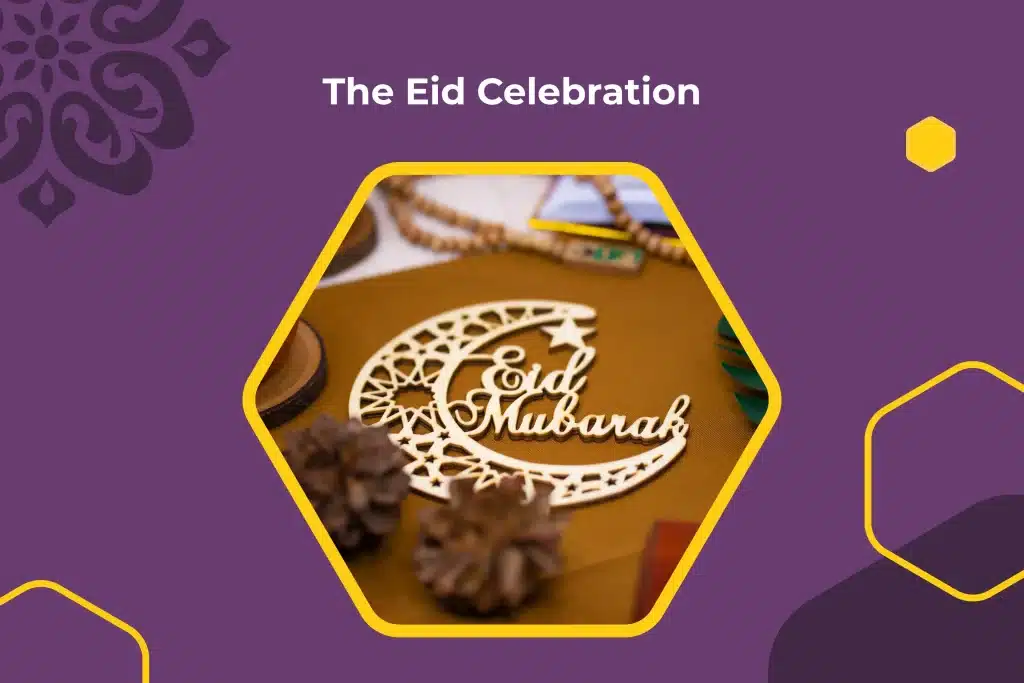
The Eid Celebration
Eid al-Fitr and Eid al-Adha are special holidays for Muslims. Families come together to pray, eat, visit relatives, and give to those in need. Eid al-Fitr marks the end of Ramadan, while Eid al-Adha commemorates sacrifice.
On the morning of the two Eids, Muslims gather for the special Eid prayer at mosques or open areas. People wear new clothes and share special meals. It’s a time of joy, forgiveness, and community spirit.
English
Arabic Word/Phrase
Transliteration
Arabic
Festival / holiday
Eid
ʿīd
عِيْد
Breaking the fast
Fitr
fitr
فِطْر
Sacrifice feast
Adha
ʾaḍḥā
أَضحَى
Praise of God (chant)
Takbīr
tak-bīr
تَكبِير
Eid Prayer
Eid Prayer
ṣalātu al-ʿīd
صَلاةُ العِيدِ
Tip from AlifBee: Eid greetings like “Eid Mubarak” (Blessed Eid) are exchanged widely. Giving Eidiya (amount of money) or sweets to children is also common.
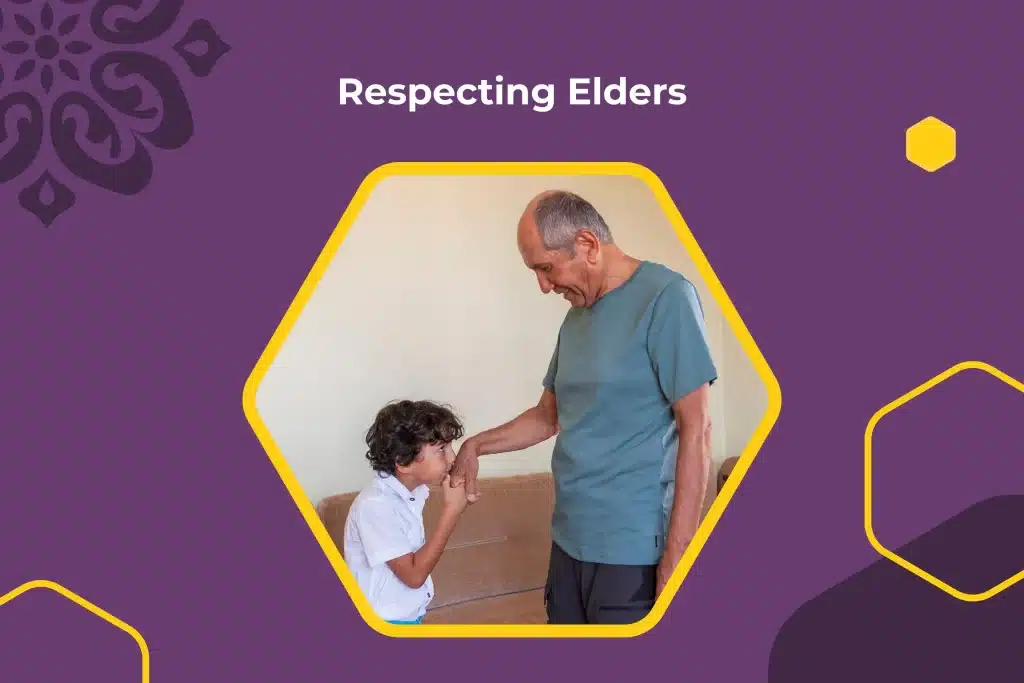
Respecting Elders
In many Arab families, elders are treated with deep respect. Younger people greet them first, offer them a good seat, and pay attention to what they say. Speaking politely, lowering one’s voice, and showing good manners are key signs of respect.
English
Arabic Word/Phrase
Transliteration
Arabic
Elder / senior
Kabīr
ka-beer
كَبِير
Respect
Iḥtirām
iḥ-ti-raam
اِحْتِرَام
Blessing
Baraka
ba-ra-ka
بَرَكَة
Manners
Adab
a-daab
أَدَب
Obedience
Ṭā‘a
ṭā-‘a
طَاعَة
Tip from AlifBee: Greeting elders first and using respectful language is seen as polite and well-mannered. Many children are taught to kiss an elder’s hand or forehead as a sign of love and honor.
Final word
Every tradition has a story and in the Arab world, stories are everywhere. They remind us that culture isn’t something we learn in books, it’s something we feel, live, and pass on.
If any of these traditions made you smile or reminded you of something warm and familiar, that’s the beauty of it, these small things connect us.
AlifBee is a good place to start learning Arabic at your own pace, download it and practice Arabic in a way that feels light and fun.
See you next time and until then, keep the spirit of these traditions close.






